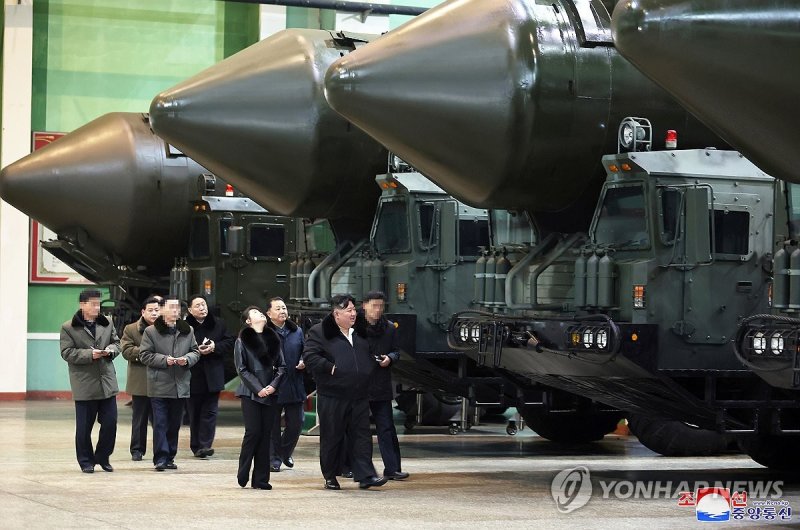“Nuclear weapons, deterring U.S. and allied nuclear attacks”
North Korean leader Kim Jong-un is inspecting strategic missile power while touring an intercontinental ballistic missile (ICBM) launcher production plant. Yonhap News
[파이낸셜뉴스] The United States recently revised its nuclear weapons operation guidelines to simultaneously deter threats from Russia, China, and North Korea, which are strengthening military cooperation.
The U.S. Department of Defense announced on the 15th (local time) that it submitted a public copy of the ‘491 Report’, which explains America’s nuclear operation strategy, to Congress the day before.
The report outlined changes to the U.S. President’s nuclear operations guidelines. No confidential information was included.
The new guidelines reflect the growing difficulty of U.S. deterrence posed by the increase, modernization, and diversity of nuclear weapons among potential adversaries.
“The United States must be able to simultaneously deter Russia, China, and North Korea during peacetime, crisis, and conflict,” the report stated.
As for Iran, unless it possesses nuclear weapons, its hostile actions in the region must be suppressed by means other than nuclear weapons. It also enabled more in-depth consultation, cooperation, and joint planning with the North Atlantic Treaty Organization (NATO) and Indo-Pacific allies.
The guidelines maintained the tone of the declarative policy announced by the United States in the 2022 Nuclear Posture Report (NPR). “As long as nuclear weapons exist, the fundamental role of U.S. nuclear weapons will be to deter nuclear attacks against the United States, its allies, and partners,” the report said.
It also includes provisions not to use or threaten to use nuclear weapons against non-nuclear-weapon countries that have joined the Treaty on the Non-Proliferation of Nuclear Weapons (NPT) and comply with their nuclear non-proliferation obligations.
He also emphasized that deterrence alone cannot respond to strategic risks and that arms control, risk reduction, and nuclear non-proliferation are important.
The United States said that as long as it determines that Russia is complying with the New Strategic Arms Reduction Treaty (New Start), the United States will also comply.
Regarding China, he said, “It has ambitiously begun the expansion, modernization, and diversification of its nuclear forces, building the three major nuclear forces at an initial level.” He added, “China’s lack of transparency and strengthening of its military offensive are raising questions about China’s intentions, nuclear strategy, and doctrine.” “It evokes,” he said.
Regarding North Korea, he said, “It is expanding, diversifying, and improving its nuclear, ballistic missile, and non-nuclear capabilities.”
“None of these nuclear challenges are formidable, but evidence of increased cooperation between Russia, China, North Korea, and Iran makes the situation more challenging,” the report said. “There is a possibility of opportunistic behavior.”
[email protected] Reporter Kang Myeong-yeon
※ Copyright ⓒ Financial News, unauthorized reproduction and redistribution prohibited


